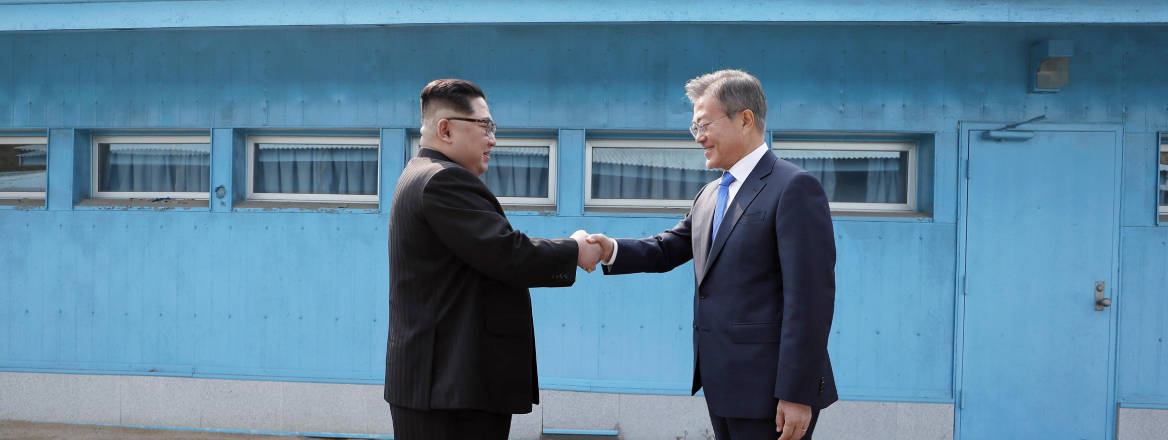Upstaging Armageddon: Kim Jong-un and the Inter-Korean Summit
When attempting to assess today’s inter-Korean summit, the adage ‘Hope for the best, prepare for the worst’ seems more appropriate than ever.
Worst-case scenarios for the Koreas spring readily to mind. Given recent events – multiple North Korean missile tests in the past year, the nuclear test on 3 September 2017, North Korean President Kim Jong-un’s long-distance rhetorical clashes with the reliably venomous US President Donald Trump, rehearsals for possible US civilian evacuation from South Korea, instability in US–South Korea relations and multiple strategic leaks from Washington about ‘preventive strike’ options – worst-case scenarios have almost become, to use another abused term of the day, normalised.
Yet it is difficult to see how both Koreas – let alone the legions of analysts trying to observe and interpret events there – could bear another year of escalation along these now well-worn lines.
The two Korean leaders who arrived at Panmunjom today to meet do so without much sound and fury echoing over the demarcation line. As an early conciliatory gesture, the South unilaterally stopped its hostile broadcasts towards North Korea a couple of days ago, has kept Thae Yong-ho (the former North Korean Number 2 in North Korea’s London Embassy who defected in August 2016) largely under wraps and away from further disparaging media comments about the North, and seems keen not to let minor disruptions turn into major ones. And despite a dramatic defection through the Truce Village – where North and South Korean forces meet in the demilitarised zone ��– late last autumn, the northern side seems unlikely to let security along the demarcation get out of hand.
As ever for North Korea, there is at play some combination of long-term planning, opportunism, and reactive actions rooted in pure survivalism
How should we interpret what North Korea is after, or up to, with the current negotiations? As ever, there is at play some combination of long-term planning, opportunism, and reactive actions rooted in pure survivalism. Since January 2018, the North has been on a significant peace offensive – probably planned well in advance. It may be that the ‘pressure campaign’ and particularly China’s participation in Pyongyang’s economic squeeze has compelled it to the negotiating table. Certainly, Kim’s recent attempts to placate Beijing amount to bending over backwards; just prior to the South Korean summit he has spent what looks like the better part of two days dealing with the death of some 30 Chinese tourists on Hwanghae’s gravelly roads.
Sanctions have clearly hurt the North’s bottom line, but the economy and system are in some ways insulated from sanctions, in that the population is readily mobilised for manual labour, mass campaigns and the like
Yet for all of the diplomatic flurry around Kim and his sister (and even his spouse), it may also be true that Kim’s statements to state scientists on 12 January about North Korea being able to endure ‘sanctions for 10 years or 100 years' represent his true, hard line, viewpoint.
Sanctions have clearly hurt the North’s bottom line, but the economy and system are in some ways insulated from sanctions, in that the population is readily mobilised for manual labour, mass campaigns and the like. The Rodong Sinmun official party daily continues to grind out editorials denouncing Western cultural imperialism, and openness to South Korean civil society and people-to-people exchanges will remain harshly limited and scrutinised by the North.
Pyongyang’s announcement on 20 April of a significant unilateral concession in ceasing ICBM tests, as well as the decommissioning of its underground nuclear test site has rightly attracted global attention. This was, however, wrapped up with the announcement a new strategic line and the reiteration of North Korea’s nuclear capability, along with some rather standard language about the need to focus again on the economy.
If 2018 is going to turn out to be a banner year for negotiations concerning the Korean peninsula, much of the credit seems likely to go to Kim Jong-un
And this is where having read a few dozen volumes of Kim Ilsung’s Works serves an appropriately enlightening purpose; there is absolutely nothing in the economic language to really get excited about and speculation that the North’s so-called ‘byungjin’ line (calling for the dual development of the national economy and nuclear weapons programmes) is now about to turn to a purely economic development remains both ahistorical, and overheated.
If 2018 is going to turn out to be a banner year for negotiations concerning the Korean peninsula, much of the credit seems likely to go to Kim Jong-un, but in part he is merely doing what needs to be done to get more long-term aid from Seoul, re-balance away from China, and continue the long-term work of splitting South Korea and the US.
Whether or not the inter-Korean summit leads smoothly into a Donald Trump–Kim Jong-un meeting, it will hopefully lead further away from overt conflict and towards more connectivity.
Having done yeoman’s work to accelerate his country and the world’s nuclear clock, Kim Jong-un is now, we must hope, rather interested in forestalling Armageddon.
Adam Cathcart is a Lecturer at the University of Leeds.
The views expressed in this Commentary are the author’s, and do not necessarily reflect those of RUSI or any other institution.

